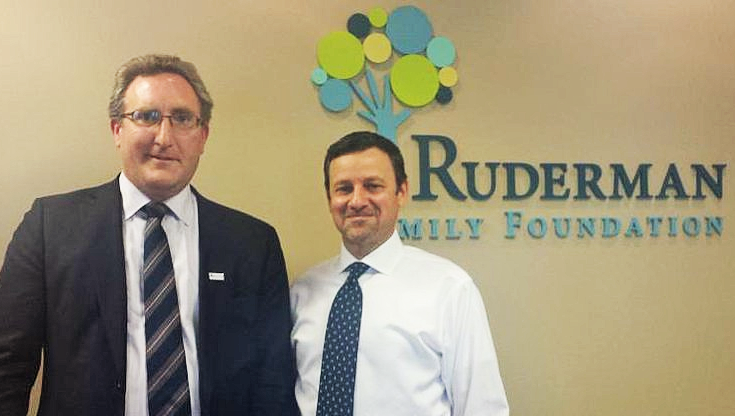
Mental illness can be a source of strength: An interview with Andy Imparato
 Andrew Imparato has served as executive director of the Association of University Centers on Disabilities (AUCD) since September, 2013. As a disability rights lawyer and policy professional with more than two decades of experience in government and advocacy roles, Imparato has worked with bipartisan policymakers to advance disability policy at the national level in the areas .of civil rights, workforce development, and disability benefits.
Andrew Imparato has served as executive director of the Association of University Centers on Disabilities (AUCD) since September, 2013. As a disability rights lawyer and policy professional with more than two decades of experience in government and advocacy roles, Imparato has worked with bipartisan policymakers to advance disability policy at the national level in the areas .of civil rights, workforce development, and disability benefits.
RFF: How did you get involved in the disability advocacy world?
Andy: In 1990, out of law school, I went to work for legal services in Cambridge, Massachusetts doing disability benefit advocacy. I learned about a Supreme Court decision that made it easier for children to qualify for Supplemental Security Income, and applied for a Skadden Fellowship to work on implementing that decision in Massachusetts. During my last semester of law school, I had my first serious episode of depression, and my work in disability advocacy coincided with me getting a diagnosis of bipolar disorder.
RFF: You’ve been very open about your bipolar disorder. How did that come about?
Andy: It was really helpful to be around people with both obvious and not so obvious disabilities. I had role models who were out. I was in an environment where I felt I had more to gain than to lose by being open. Being open gave me a stronger connection to my client community. Over time, I have been a strong voice for others to come out with mental illness and other non-apparent disabilities.
RFF: What do you say to others who are weighing the consequences about whether to be open?
Andy: I’m definitely an advocate for people coming out at work. I’ve learned that people are generally happier when they don’t have to worry about who knows and who doesn’t know about their diagnosis. When people are out at work they can change attitudes of others and connect with others in a deeper way. This can help both personally and professionally.
The decision is a personal one, and can depend on where you are in your career and the nature of your job and your disability. Some people don’t need an accommodation from day one so don’t feel the need to come out until they have already established themselves as a valuable worker. There are studies that suggest that many employers will weed out people with disabilities, especially mental illness. So some people may be rightfully concerned, particularly early on in their careers when they are just developing a resume.
Another challenge is that many mental health professionals advise against being open.
I realize that my positive experiences may not be easily replicated—not everyone has really strong academic credentials or chooses to work in the disability field—but I still think that in most cases there are more pros than cons to being out with your disability.
At the end of the day, people will be more likely to come out if their work culture encourages it. So there’s much work to be done in creating more inclusive work cultures.
RFF: You’ve made your home in the disability community rather than in the mental health world. Why is that?
Andy: For me, when I first started working in disability advocacy, I appreciated the concept that disability is viewed as a natural part of the human experience. Mental health advocates tend to stress the biology of mental illness and parity with physical illness, so sometimes there is a strong emphasis on diagnosis and treatment in mental health, and less so on disability rights. I find the disability rights approach more empowering, and I’ve always felt at home in the disability community.
RFF: In the autism community, there’s a strong sense that people shouldn’t see autism as merely a disability, but an alternative set of strengths and weaknesses. Does that sensibility exist in the mental health community as well?
Andy: I admire the neuro-diversity movement, which celebrates the rich variety of human minds. When I was in law school and became depressed, I was unaware that people with mental illness could be great contributors and even find strength from it. I had only been given a negative frame of reference. Most media messages around mental illness are negative and connected to violence.
There is currently not a strong neuro-diversity movement around mental illness but there could be. When I received my bipolar diagnosis, I called up one of my law professor mentors, the esteemed Constitutional scholar Gerald Gunther, and informed him about my condition. “You are in good company,” he said. Professor Gunther had just finished writing a biography of the great Judge Learned Hand, and he believed that Learned Hand was bipolar.
It turned out that my mental illness was indeed a strength. I have had success in a number of jobs in no small part due to the abundant energy associated with my condition. When we talk about or hear about bipolar disorder or other forms of mental illness, we rarely hear about the positives that can be associated with the symptoms.
I don’t see a groundswell in the psychiatric disability community around disability pride like I see in the autistic community. Many leaders in the psychiatric disability community talk about having “recovered” or “survived” the mental health system, and their identity comes more from that shared experience. I am hopeful that over time the people with lived experience of mental illness will develop a stronger sense of disability pride and a stronger sense of solidarity with the rest of the disability community.
About the author David Bernstein is a consultant and communications adviser to the Ruderman Family Foundation. Follow him on Twitter @DavidLBernstein
Stay Included
To stay up to date on our most recent advocacy efforts, events and exciting developments, subscribe to our newsletter and blog!



















